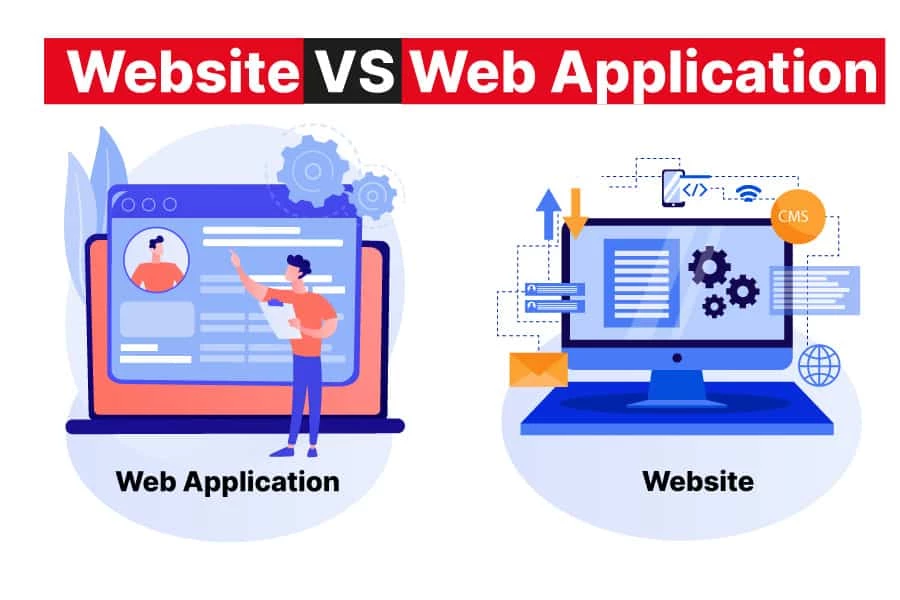
This website vs web application comparison is a vital topic. Why? Most people use them interchangeably.
Well, firstly, a website and a web application are similar. Both are accessible via a browser, and you need an internet connection.
However, while web applications can be standalone or incorporated as part of a larger website, websites stand alone and comprise static pages.
Websites and web applications are different. So, before you make any decision on which to choose for your business, I urge you to read this post to have a clearer understanding of the differences between both.
Alright, let’s dive in together.
What Is A Website?

An example of a website is BitChipDigital.com. You can see that this website comprises a collection of webpages that has one domain name and are hosted on a server.
At BitChip Digital, we view websites as a business’s sales representative. Why? The website is the first thing most of your potential customers would see before you (the business owner) or your employees.
People can access your website any time of the day. In other words, a website runs 24/7 and is available to potential customers. As a business owner, you can’t be available 24/7 to attend to customers’ requests, orders, or quarries.
The only time a website can become inaccessible is when the server is down, your domain subscription expires, or it has been taken down.
But then, server issues don’t take long to fix unless the problem the server company is experiencing is severe.
A Pro Tip: A website is crucial for your startup or existing business. And don’t settle for less. Get a professional-looking, feature-rich, mobile-friendly and responsive website. With such a website, you have laid a good foundation for your marketing strategies to thrive and yield incredible results.
A website can be custom-made or based on a content management system (CMS), such as WordPress, Wix, etc.
You can get a web developer or programmer to build a custom website for your business using any programming language of your choice. These include CSS, HTML, and Java.
However, many websites are built on CMS. Examples include BBC, Microsoft News, Sony Music Time Magazine, etc.
Here are statistics about WordPress and other CMS
- WordPress is utilized by 64.3% of all websites whose CMS is widely known. [W3Techs]
- WordPress powers 36.28% of the top one million websites out there. [BuiltWith]. In this case, the “Top Websites” are based on the traffic they receive. Examples include New York Times, Bloomberg, and Nike.
- Wix is utilized by 3.4% of all websites whose content management systems are known. [W3Techs]. This equates to 2.3% of all websites.
- There are currently over 234 million Wix users. [Wix]
Bonus: You can check out the most popular programming language here.
Moving further, I would also like you to know that a website can contain images, texts, videos, audio, and documents, including other internet-accessible content.
Websites can also be categorized into Static and Dynamic websites. The Static Website, as the name suggests, is fixed and displays the same content for every user. The advantage this website has is that it loads faster compared to dynamic websites.
On the other hand, Dynamic Websites are the opposite. They are data-driven websites that display different content depending on the time of the day, viewer, and time zone.
Dynamic websites’ information is generated in real-time.
10 Types of Websites You Need To Know

Below are some of the websites you’ll encounter on the internet. You can choose based on your business niche and preference.
- Blog website
- Business website
- eCommerce website
- Event website
- Online forum
- Portfolio website
- Personal website
- Non-profit website
- Membership website
- Informational website
You can see the different types of websites. Choose the one that best suits your business.
Always have at the back of your mind that having a website is a great way to establish a digital presence. And you must ensure your website is top-notch.
Adobe did a study and discovered that 38% of people might stop engaging with a website if they find its layout and content unattractive.
Another eye-opening study came from Stanford’s Web Credibility Research. The researchers claimed that people judge a brand’s credibility based on its website.
Now, let’s move to web applications.
What Is A Web Application?
A web app refers to computer programs that utilize web browsers, including web technology, to perform specific functions.
Web applications can also run on any device. They can run on a desktop computer and even your mobile device browser on a tablet or phone.
An example of a web app is the contact form on websites.
Regardless of the device you use web apps on, it will remain responsive. These apps are also designed to be as interactive as mobile applications.
A web application is a client-server program. What does this imply? It means the web app boasts a client and server side, different from each other.
What does the term “client” on the client-server side mean? It refers to the program used to run the web application. And it is part of the client-server environment where many computer systems share information.
Regarding the database, the client refers to the program through which users enter data, while the server refers to the program used to store data.
The internet allows companies to communicate with customers and ensure they conclude their transactions smoothly. But note that there won’t be such interactions without web applications.
The web app allows businesses to capture, store data, and make the results made available to users.
An example of a web app is the shopping cart. With this app, online shoppers can shop conveniently.
So, web applications are as critical to individuals or customers as businesses. Each web app has a unique usage or purpose for which it was designed.
You may have witnessed how the shopping cart makes online shopping a breeze.
Companies also benefit massively from the use of web applications. Several departments can collaborate on the same project via a single web app. They can share reports and data and make inputs whenever and wherever they find themselves.
8 Types of Web Applications And Examples You Need To Know

1: Static Web Application:
This app is a wise choice for publishing companies. And you don’t need to install any third-party program to access it. You can access the static web app directly from the browser.
Another unique feature this class of web app has is that you can access it in offline mode.
Java, CSS, and HTML are the major programming languages used to build static web applications. The app is also easy to build.
Or, maybe I am using the word “easy” because my team and I build web apps for fun. Anyway, incorporating fun into a web app development project will make the process enjoyable.
Furthermore, note that the static web app doesn’t pull data from the server. Instead, the content will be available on the user’s web browser.
You can get super creative when developing static web apps. You can incorporate GIFs and videos in your static web apps.
2: Dynamic Web Applications:
Dynamic web applications’ easy user management is one of the reasons they are widely used. You can manage your entire users on the site and ensure proper protection for your server.
What language is a dynamic web application built with? They are developed via server-side language and technology.
The dynamic web application allows the content of each page to be delivered based on user-generated content or user behavior.
Let me explain using Netflix, a dynamic web application, as an example. You’ll find movies in diverse genres when you log into your Netflix account.
Let’s say your preference is action movies. When you click on a specific action movie, other action movies in that genre will display to you. That’s how a dynamic web application works.
A Pro Tip: In dynamic web applications, all your content and data are organized in a database or a back-end CMS (Content Management System).
Dynamic web applications examples:
- CNN
- Disney Plus
- Netflix
- HubSpot
3: Single Page Web Applications:
The single-page app (SPA) does as its name suggests. This app works within a browser and loads only a single page.
A quick example of a single-page app is Gmail. I know you already know what SPA is with the example I have just provided.
Single-page web applications examples:
Here are some apps considered single-page applications.
- Gmail
- PayPal
- Airbnb
- Google Maps
Many companies on the internet are utilizing single-page applications to build platforms that offer fluid and scalable experiences.
SPAs have become a must-have for Trello, Meta, Twitter, and the tech titan, Google.
4: Multiple Page Applications:
As the name implies, multiple-page apps (MPAs for short) consist of diverse pages. It is the direct opposite of a single page.
In other words, while single-page apps boast only one page, multiple-page apps have more than one page.
Another thing that characterizes these apps is that the whole page will reload when you try to load a page.
A Handy Tip: Single-page web apps load faster than multiple-page apps.
You only have to load the single-page app once and never have to reload again until you leave the site.
Let’s use Amazon, an eCommerce platform using a multiple-page web application. When you click on an item, let’s say, “Multi-process welder,” it will be added to your cart.
Once the item is in your cart, you have to click on next to move to the next page until you get to where you have to make payment, and so on.
Multi Page apps examples
- Amazons
- eBay
- Trello
- Forums
- Google Docs
5: Animated Web applications:
Animated web apps’ designs and approaches enable them to attract and grab visitors’ attention.
Flash, CSS, SVG, JavaScript, and HTML5 create animated web apps.
So, what are the examples of the content management system? Check them out below.
- WordPress
- Joomla
- Drupal
- Wix
- Squarespace
- Magento (eCommerce)
- PrestaShop (eCommerce)
6: eCommerce Web Applications:
Anyone that shops online can give eCommerce web app examples. An example of such a web app is Amazon, a popular eCommerce platform where you can get a wide range of products from diverse brands.
What are eCommerce web applications? These apps are designed to help people purchase or sell online quickly.
The app is usually designed to enable sellers to display pictures of various products. And you can search for products with ease, make payments online and place an order on these eCommerce web apps from the comfort of your home.
This web app is best for eCommerce businesses. It will allow your business to expand and reach a wider audience.
These platforms make it possible for someone in China to check the products listed on the platform of a company located in the USA and make a choice. You don’t need to visit the business’ location in person to know the products they have in store.
The transaction and payment integrations are part of the eCommerce web apps, which makes them exceptional.
The app also draws on other technologies like mobile commerce, supply chain management, inventory management system, and the internet market.
Here are some quick examples of eCommerce web apps.
- Amazon
- eBay
- Walmart
7: Portal applications:
Examples of portal apps include Udemy and Coursera. These popular platforms offer courses in various fields, from Excel to IT, for a token.
Udemy and Coursera allow individuals from across the globe to learn diverse skills without paying huge fees. The platforms host professionals from various fields.
You’ll find videos on various courses explained in detail on these platforms.
8: Progress Web Applications:
Note that apps in this category are built using basic programming languages. These include JavaScript, CSS, and HTML.
What makes these apps unique is their responsiveness. Progressive apps are highly responsive, ensuring a better user experience.
Another thing that sets them apart is that they’re super easy to work with offline and online.
What are progressive web apps? It is easier to identify progressive web apps. How? These apps boast the latest cross-platform browser API (Application Programming Interface), including the latest features and advanced improvement techniques that allows web applications to deliver a similar experience as native apps.
A Handy Tip: A simple way to understand a progressive web app is for you to consider a responsive website and add native application functionalities to that website. That’s progressive apps.
I mentioned earlier that these apps are built using lightweight web tech. Why? The reason is to ensure progressive web apps are highly responsive. As you know, speed is vital for conversion.
Examples of lightweight web tech used are JavaScript, HTML, and CSS.
Below are examples of progressive web applications:
- BMW
- Uber
- Spotify
- Telegram
- Adidas
- Trivago
- Eleganza
- AliExpress
- The Washington Post
Website vs. Web Application 7 Key Differences You Should Know
As I said before, websites and web apps have some similarities. You need the internet to access both. Additionally, you can access both through a browser.
Below is a table showing the differences between websites and web applications.
| Website | Web Application | |
| 1. | Perform an informative role. In other words, a website’s purpose is to inform visitors. | The purpose is to help visitors perform specific tasks. |
| 2. | Visitors can view, listen to, and read a website’s content but cannot manipulate it. | Content on web apps is viewable and boasts interactive elements. Visitors can manipulate data on a web app.
The contact form is an example of an interactive web app. |
| 3. | Websites are a collection of several static pages and are a breeze to build. | Web applications are more challenging to build. They are also more complex than websites. |
| 4. | A website is accessible and available to the public whenever and wherever. However, the owner may decide to blog people from specific regions from viewing their website. | Web applications require authentication and a form of registration to access. They require authentication because they render services tailored to users’ requirements. |
| 5. | Hosting a website is less expensive because there is plenty of data to process. | Web applications cost more to host because they require more components like back-end and database solutions. You’ll also increase your computer’s resources, such as CPU, storage, and RAM capacity. |
| 6. | Integration on a website is more straightforward. | Integration is highly complex. |
Conclusion
This website vs web application comparison is to help you understand their similarities and differences.
I believe you now understand the key differences between both and can make an informed decision.
However, if you cannot decide which is the best for your business, you can contact our website and web app development experts to help you out.
Why Choose BitChip Digital?
BitChip Digital is a digital marketing agency eager to see businesses succeed online.
We have assembled the finest team comprising website and web app developers to meet your creative needs.
You can contact us for expert ideas on which platform will suit your business more. Our experts are waiting to chat with you and get your projects sorted.
So are you ready to take your business to the next level? If yes, contact us right away.

